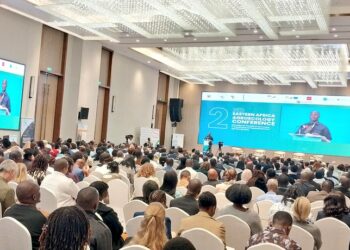As Ugandans and the people in Busoga in particular strive for success and prosperity, with a strong emphasis on education, a critical aspect of their well-being is being grossly neglected and that is public health.
In the streets of urban centres in Busoga, a disturbing trend has become all too common. Smartly dressed men and women, driving posh cars, can be seen throwing empty mineral water bottles, banana peels, and other waste out of their car windows, littering the streets.
But that’s not all as some individuals, who appear to be respectable members of society, can be seen clearing their throats and noses, only to spit their saliva onto the pavement.
Others, in a shocking display of recklessness, throw used condoms out of their rented room windows, leaving them to be picked up by innocent children who unknowingly play with them as if they were balloons.
This blatant disregard for public health and hygiene is a stark reminder of the grave challenges facing Busoga.
The region’s struggles with poor sanitation, inadequate waste management, and a general lack of awareness about public health issues have created a perfect storm of preventable diseases and health risks.
And it is not just the obvious health risks that are concerning. The lack of attention to public health and hygiene also perpetuates poverty cycles, reduces economic opportunities, and undermines the overall well-being of communities.
The alarming state of public health in Busoga has prompted Senior Presidential Advisor on Poverty Alleviation, Mrs. Florence Mutyabule, to sound the alarm and urge everyone to take immediate action.
According to Mrs. Mutyabule, the key to addressing the public health crisis in Busoga lies in intensifying sensitization campaigns at all levels of society.
“…We need to start from the household level, where families can learn and practice good hygiene habits…,” she emphasized.
Mrs. Mutyabule also stressed the importance of incorporating public health education into school curricula, ensuring that children learn about the importance of sanitation, hygiene, and disease prevention from a young age.
Furthermore, she called on offices and workplaces to promote public health awareness among employees, recognizing that a healthy workforce is essential for economic productivity and growth.
Mrs. Mutyabule is also urging the general public to take an active role in promoting public health awareness, whether through community outreach programs, radio stations and social media campaigns, or simply by setting a good example for others to follow.
Public health is the science of protecting and improving the health of people and their communities. It’s all about keeping populations healthy, improving their health and preventing disease.
According to the World Health Organization (WHO), public health aims to improve the health of populations by addressing the social, economic and environmental determinants of health.
Health experts also emphasize that public health is not just about preventing disease but also about promoting health and wellbeing.
In Busoga, a sub-region in eastern Uganda, the state of public health and sanitation is a pressing concern that can either hinder or promote poverty and wealth creation.
The region has been grappling with numerous public health issues, including high prevalence rates of malaria, teenage pregnancies, and mental health concerns.
Poor sanitation and hygiene practices, such as open defecation, have led to the proliferation of diseases like cholera, diarrhea, and typhoid fever.
Low Pit Latrine Coverage in Rural Settings.
In rural areas, the coverage of pit latrines is low, and many households lack access to improved sanitation facilities. This forces people to practice open defecation, which contaminates water sources, soil, and food, leading to the spread of diseases.
Inadequate Sanitation in Urban Areas.
In urban areas, including towns and cities, the situation is not much better. Many people lack access to modern toilets and instead use polythene papers(buveera) as makeshift toilets. These papers are then dumped in the streets, roadsides, and backstreets, creating unsanitary conditions and contributing to the spread of diseases.
These diseases not only have devastating health consequences but also perpetuate poverty cycles. For instance, medical expenses for treating these diseases can be catastrophic, pushing families deeper into poverty.
Moreover, according to experts, the lack of access to sanitation facilities and poor waste management can lead to soil and water pollution, reducing agricultural productivity and access to clean water.
This can have far-reaching implications for the region’s economy, particularly in the agriculture sector, which is a significant contributor to the country’s GDP.
In response to these challenges, Mrs. Florence Mutyabule, the Senior Presidential Advisor (SPA) on Poverty Alleviation in Busoga, continues to advocate for simple yet effective public health and hygiene practices that can help prevent the spread of diseases.
According to Mrs. Mutyabule, families in Busoga can play a crucial role in promoting public health and hygiene by adopting simple practices.
“…We need to encourage families to install simple and affordable handwashing facilities, properly dispose of pampers, solid and liquid wastes, and kitchen wastes…,” she said.
The dumping of baby pampers on the streets is another serious concern so rampant in Jinja City and all other major towns like Iganga, Bugiri, Namutumba, Mayuge, Kaliro and Kamuli, among others.
Environmental experts say these pampers can take hundreds of years to decompose and can contaminate soil and water sources, posing a significant risk to public health.
She also stressed the need to teach children on proper use of sanitary facilities, support teenage girls with pads, and encourage the use of handkerchiefs.
Mrs. Mutyabule also cautioned the mostly conservative residents to avoid traditional habits like handshaking and hugging, which can help prevent the spread of deadly diseases like Ebola.
“…by adopting these simple practices, families in Busoga can help prevent the spread of diseases, promote good hygiene practices, and ultimately improve their overall well-being…,” she said.
Mrs. Mutyabule’s efforts to promote public health and hygiene practices in Busoga are being seen as a step in the right direction.
“…By working together, families, communities, and leaders can help prevent the spread of diseases and promote a healthier, more prosperous region…”, says Michael Kifubangabo a teacher of Biology at Jinja SS and specialist in public health.
The Human Cost of Public Health Neglect
Experts say the consequences of Busoga’s public health neglect are not just statistical; they have a human face.
Families are losing loved ones to preventable diseases, while children are growing up in environments that are detrimental to their health.
The lack of access to clean water, sanitation, and hygiene (WASH) facilities is a major contributor to the spread of diseases.
Mrs. Mutyabule’s plea for residents to take public health seriously is a call to action that requires immediate attention and that the government, civil society, and individuals must work together to address the systemic issues that have led to the neglect of public health.
To address the challenges of open defecation and inadequate sanitation in the region, the local governments, civil society organizations like Busoga Trust, and individuals must work together to increase access to improved sanitation facilities.
She singled out Busoga Trust, a not-for -profit Church founded charity organization that has done a lot in transforming lives of people in Busoga on clean and safe water, sanitation and hygiene.
“…their work in providing clean water, sanitation facilities and healthcare services has been truly transformative, its commitment to serving the most vulnerable of our community is a shining example of kindness…”, she applauded.
Busoga Trust is a UK-based charity organization that works to improve the lives of people in Busoga, Uganda by providing access to clean water, sanitation and healthcare.
It was established in 1980 by a group of Christians who were passionate about serving the people of Busoga. It’s a community-led organization that works closely with local communities to identify their needs and develop solutions that are tailored to their context.
Busoga Trust focuses on Water, Sanitation and Hygiene (WASH) providing clean water, sanitation facilities and promoting good hygiene practices to reduce the incidence of water-borne diseases.
Do you have a story in your community or an opinion to share with us: Email us at editorial@watchdoguganda.com













